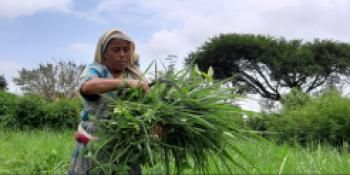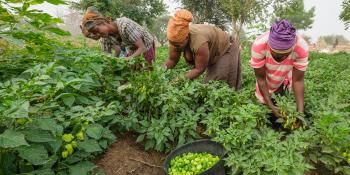Understanding what could empower women farmers

By Caity Peterson
Most of us would think that the way to make women better farmers is to empower women farmers. The logic is there. The directness of the approach is appealing. So what are we missing?
On day one of the Second Global Conference on Agricultural Research for Development, (GCARD2), the Policy Forum on Agricultural Innovation for Rural Women gave conference-goers a taste of progressive research and initiatives aiming to improve the state of rural women for food security.
We may not realize it, but women, especially in Africa, prefer to get their information from other women. They can relate better, they feel more comfortable and are more willing to work together. With men, they have less confidence and are less likely to open up.
Bridgit Muasa, from the Kenya Ministry of Livestock Development, explained what that means for agricultural research for development: If we want better women farmers, we need better women leaders. That is to say, we need women professionals, women educators, and women mentors higher up on the information chain.
The empowerment of women through education allows them to become leaders in the agricultural field. The result is a trickle-down effect; women farmers gradually become more empowered too, as they are more likely to receive and utilize helpful advice if it comes from a fellow woman.
“When I was in veterinary school,” said Muasa, “there were 20 women in a class of 150. When I was in graduate school the ratio was even worse: I was one of only 4 women. It was not always easy to find a mentor or lecturer to take me under their wing or really inspire me.”
Which is why, she asserted, it was such a breakthrough to receive the competitive African Women in Agricultural Research and Development Fellowship (AWARD) in 2010. Finally, she was granted access to a wealth of resources, and most importantly, mentors, to guide her intellectual development.
Muasa emphasized that the challenge now is to make opportunities like the AWARD fellowship more widely available in developing countries. The competitiveness of the current program means that, in the end, very few women are benefiting. Funds are needed to expand these types of initiatives so that more women professionals may begin serving their fellow women farmers, not only as information conduits but as examples in initiative and leadership.
An empowered, educated woman does not live in a vacuum. If Muasa’s example serves for other women in developing country, then one empowered woman creates more empowered women. That includes women farmers, and that means good things for food security.
Read more about our work on gender in the context of agriculture and climate change.
Follow the gender conversation at the GCARD2 conference, and keep track of happenings on the GCARD2 social media platform.
Caity Peterson is a visiting researcher based at the International Center for Tropical Agriculture (CIAT) in Colombia, working on CCAFS Theme 1: Adaptation to Progressive Climate Change. To get more updates, follow us on Facebook, and Twitter @Cgiarclimate.


